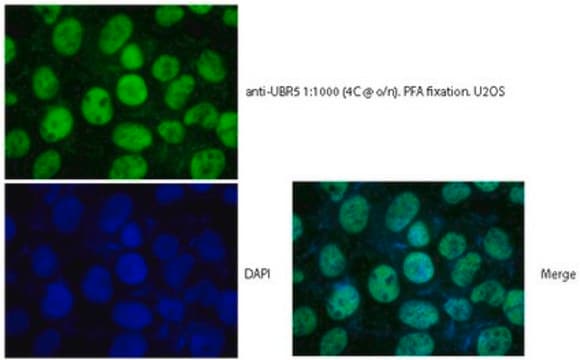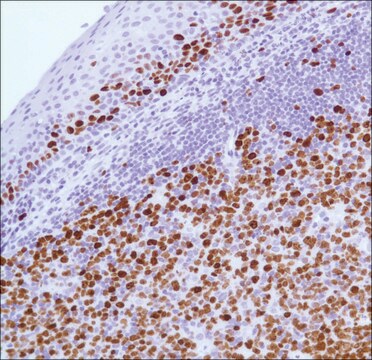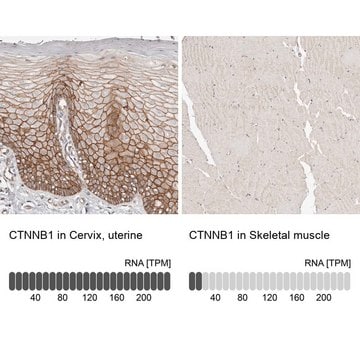HPA037837
Anti-IPMK antibody produced in rabbit

affinity isolated antibody, buffered aqueous glycerol solution
Synonym(e):
Anti-Inositol polyphosphate multikinase
Größe auswählen
CHF 556.00
Größe auswählen
About This Item
CHF 556.00
Empfohlene Produkte
Biologische Quelle
rabbit
Konjugat
unconjugated
Antikörperform
affinity isolated antibody
Antikörper-Produkttyp
primary antibodies
Klon
polyclonal
Form
buffered aqueous glycerol solution
Speziesreaktivität
human
Erweiterte Validierung
recombinant expression
Learn more about Antibody Enhanced Validation
Methode(n)
immunofluorescence: 0.25-2 μg/mL
Immunogene Sequenz
DCFDGVLLELRKYLPKYYGIWSPPTAPNDLYLKLEDVTHKFNKPCIMDVKIGQKSYDPFASSEKIQQQVSKYPLMEEIGFLVLGMRVYHVHSD
UniProt-Hinterlegungsnummer
Versandbedingung
wet ice
Lagertemp.
−20°C
Posttranslationale Modifikation Target
unmodified
Angaben zum Gen
human ... IPMK(253430)
Verwandte Kategorien
Allgemeine Beschreibung
Immunogen
Anwendung
- lymphoblasts by immunoprecipitation
- human adenocarcinogenic cell lines by western blotting
- in mouse 3T3 cells by western blotting
Biochem./physiol. Wirkung
Leistungsmerkmale und Vorteile
Every Prestige Antibody is tested in the following ways:
- IHC tissue array of 44 normal human tissues and 20 of the most common cancer type tissues.
- Protein array of 364 human recombinant protein fragments.
Verlinkung
Physikalische Form
Rechtliche Hinweise
Haftungsausschluss
Sie haben nicht das passende Produkt gefunden?
Probieren Sie unser Produkt-Auswahlhilfe. aus.
Lagerklassenschlüssel
10 - Combustible liquids
WGK
WGK 1
Flammpunkt (°F)
Not applicable
Flammpunkt (°C)
Not applicable
Hier finden Sie alle aktuellen Versionen:
Analysenzertifikate (COA)
Die passende Version wird nicht angezeigt?
Wenn Sie eine bestimmte Version benötigen, können Sie anhand der Lot- oder Chargennummer nach einem spezifischen Zertifikat suchen.
Besitzen Sie dieses Produkt bereits?
In der Dokumentenbibliothek finden Sie die Dokumentation zu den Produkten, die Sie kürzlich erworben haben.
Active Filters
Unser Team von Wissenschaftlern verfügt über Erfahrung in allen Forschungsbereichen einschließlich Life Science, Materialwissenschaften, chemischer Synthese, Chromatographie, Analytik und vielen mehr..
Setzen Sie sich mit dem technischen Dienst in Verbindung.








